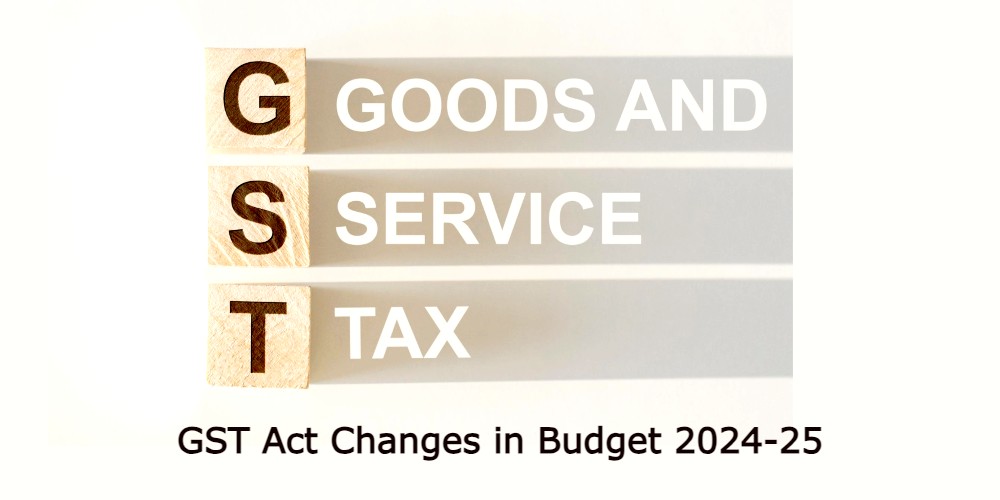What Everyone Needs to Know About the GST Act Changes in Budget 2024-25

Introduction
The Union Budget 2024-25 has been one of the most eagerly anticipated financial events in recent years. While the budget may have left investors and traders seeking more favorable terms, it succeeded in garnering positive attention from the general public due to significant amendments in tax slabs and, more importantly, key changes in the Goods and Services Tax (GST) regime. This article delves into the specific alterations in the GST Act, exploring how they may impact various sectors.
Major GST Changes in Budget 2024-25
The amendments brought forward in the Budget 2024-25 under the GST framework include changes in several key sections of the Central Goods and Services Tax (CGST) Act, Integrated Goods and Services Tax (IGST) Act, and Union Territory Goods and Services Tax (UTGST) Act. These adjustments are poised to reshape the landscape of taxation on certain goods and services.
Removal of GST on Un-Denatured Extra-Neutral Alcohol
One of the most noteworthy amendments is the exclusion of un-denatured extra-neutral alcohol, also known as rectified spirit, from the ambit of GST, In line with the updates to Section 9 of the Central GST Act, Section 5 of the Integrated GST Act, and Section 7 of the Union Territory GST Act. This substance, commonly utilized in producing alcoholic beverages, will no longer be subject to GST, a change that industry experts predict could potentially lower alcohol prices. This move is anticipated to bring significant relief to manufacturers and consumers alike, particularly in the beverage industry.
Clarification of Supply Duration for Services
Changes to Section 13 have introduced a more straightforward approach to determining the supply duration for services, particularly in reverse charge scenarios where recipients are responsible for generating invoices. This amendment aims to streamline the invoicing process, ensuring clarity and compliance in service transactions.
Refund Restrictions on Export Duties
An important change in Section 54(15) now specifies that no GST refund of unutilized Input Tax Credit (ITC) or IGST will be granted for zero-rated supplies of goods that incur export duties. This adjustment intends to align the refund policy more closely with the principles of tax equity, affecting exporters who must now consider this limitation in their financial planning.
Modifications to Appeal Deposits
Modifications in Section 107 of the CGST Act have reduced the threshold for filing appeals for pre-deposits from Rs. 25 crores to Rs. 20 crores. Similarly, the IGST Act has seen a decrease in this requirement from Rs. 50 crores to Rs. 40 crores. These reductions are expected to encourage businesses, especially small and medium enterprises, to pursue their appeals without the burden of substantial financial commitments.
New Sections Introduced in the GST Act
The Budget 2024-25 also witnessed the introduction of several new sections aimed at enhancing compliance and offering more flexibility within the GST framework.
Introduction of Section 74A
Section 74A provides a new strategy for dealing with errors in tax payments. In cases where tax amounts have not been paid, refunded erroneously, underpaid, or where input tax credit has been availed or utilized improperly, the responsible taxpayer must respond to a notice from the tax authorities. However, this provision applies only to amounts exceeding Rs. 1000 in a financial year, commencing in 2024-25. This section underscores the government's commitment to fostering transparency and accountability in tax administration.
Regularization of Short-Levy or Non-Levy of Central Tax
Section 11A targets the correction of under-levy or non-levy of central taxes caused by conventional trade practices. This newly introduced provision empowers authorities to correct past inefficiencies, thereby aligning tax collection with contemporary business practices and expectations.
Retrospective ITC Claims
Sub-section (5) of Section 16 has been retrospectively added to enable claims on ITC for debit notes and invoices from FY 2017-2018 to FY 2020-2021. This retrospective measure is a significant relief for businesses seeking to rectify past oversights and optimize their tax liabilities. It represents a move towards a more inclusive and accommodating tax environment, recognizing the challenges businesses may have faced in previous fiscal years.
Conditional Waiver of Penalty and Interest
The introduction of Section 128A allows for conditional leniency on penalties and interest for demands arising under Section 73. Covering financial years 2017-18 to 2019-20, this waiver offers a much-needed respite to businesses that have been grappling with financial challenges arising from tax disputes. By offering conditional relief, the government aims to foster goodwill and encourage compliance among the business community.
The Influence of GST Modifications on Business Practices and Economic Stability
The alterations to the GST Act introduced in the Budget 2024-25 are expected to have a multifaceted impact on the business landscape and the broader economy. By allowing retrospective ITC claims, offering conditional waivers, and reducing pre-deposit requirements for appeals, these changes are poised to support the growth and development of small and medium-sized enterprises (SMEs).
The exclusion of un-denatured extra-neutral alcohol from GST could lead to competitive pricing in the beverage industry, benefiting consumers and manufacturers alike. The introduction of new provisions aimed at regularizing tax anomalies and ensuring compliance reflects the government's commitment to building a robust and efficient tax framework.
While these changes appear largely positive, businesses must stay attuned to further announcements and proposed schemes that may emerge in the coming months. Staying informed and adapting to these developments will be crucial for businesses aiming to thrive in an evolving economic landscape.
Frequently Asked Questions
-
What are the major GST changes introduced in the Budget 2024-25?
The major GST changes in the Budget 2024-25 include amendments to key sections of the Central Goods and Services Tax (CGST) Act, Integrated Goods and Services Tax (IGST) Act, and Union Territory Goods and Services Tax (UTGST) Act. These changes aim to reshape taxation on various goods and services.
-
What is the significance of removing GST on un-denatured extra-neutral alcohol?
The removal of GST on un-denatured extra-neutral alcohol means that this substance, commonly used in making alcoholic beverages, is now tax-free. This change is expected to lower alcohol prices, benefiting both manufacturers and consumers in the beverage industry.
-
How does the Budget 2024-25 affect the supply duration for services?
The changes to Section 13 introduce a clearer method for determining the supply duration for services, especially in reverse charge scenarios. This amendment simplifies the invoicing process, ensuring better compliance and clarity in service transactions.
-
What are the new refund restrictions on export duties?
Section 54(15) specifies that GST refunds of unutilized Input Tax Credit (ITC) or IGST will not be granted for zero-rated supplies of goods with export duties. Exporters must consider this limitation in their financial planning.
-
What changes have been made to appeal deposits?
The threshold for filing appeals with pre-deposits has been reduced. In the CGST Act, it's lowered from Rs. 25 crores to Rs. 20 crores, and in the IGST Act, from Rs. 50 crores to Rs. 40 crores. These reductions are aimed at easing the appeal process for businesses, particularly small and medium enterprises.



